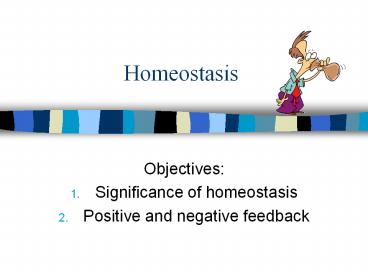Homeostasis - PowerPoint PPT Presentation
Title:
Homeostasis
Description:
Homeostasis Objectives: Significance of homeostasis Positive and negative feedback Disruption of Homeostasis Disruption of Homeostasis Disruption of Homeostasis ... – PowerPoint PPT presentation
Number of Views:522
Avg rating:3.0/5.0
Title: Homeostasis
1
Homeostasis
- Objectives
- Significance of homeostasis
- Positive and negative feedback
2
Disruption of Homeostasis
3
Disruption of Homeostasis
4
Disruption of Homeostasis
5
Disruption of Homeostasis
- Polycystic Kidney Disease
6
Disruption of Homeostasis
7
(No Transcript)
8
(No Transcript)
9
- Start here
10
Two ways to maintain homeostatis
- Negative feedback
- Positive feedback
11
Negative Feedback example body temperature
12
Q1 compare response to original stimulus
- Answer
- The response by the effectors is antagonistic
(opposite) of the stimulus - Stimulus body temp ?
- Response body temp ?
13
Q2 homeostasis restored? How do you know?
- Answer
- Yes, because the response counteracts the
stimulus - Brings back balance
14
Positive Feedback example labor contractions
15
Q3 compare response and stimulus in positive
feedback
- Answer
- The response acts to heighten or increase the
stimulus - Stimulus ? distortion of uterus
- Response ? distortion and contraction of
- uterus
16
Q4 Is homeostasis restored in this example? How
do you know?
- Answer
- No, homeostasis is continually disrupted
- This is a good thing in this case b/c returning
to homeostasis would cause the birthing process
to stop. - The positive feedback loop will continue until
birth is complete.
17
Lots of examples of negative feedback loops, few
positive loops
- Blood glucose pages ____
- Blood clotting pages _____
- Blood calcium level pages ______
- Female reproductive cycle pages ____
18
About Drinking Water
- One glass of water shuts down midnight hunger
pangs for almost 100 of the dieters studied in a
University study. - Lack of water is the 1 trigger of daytime
fatigue. - 9-10 glasses of water a day could significantly
ease back and joint pain for up to 80 of
sufferers.
19
More water stuff
- A mere 2 drop in body water can trigger fuzzy
short-term memory, trouble with basic math, and
difficulty focusing. - Drinking 5 glasses of water daily decreases the
risk of colon cancer by 45, breast cancer by 79
and one is 50 less likely to develop bladder
cancer.
20
Cellular homeostasis
- Every level of organization within the body must
maintain homeostasis
Phospholipid Bilayer
21
Diffusion
- Diffusion is the movement of molecules from a
higher concentration to a lower concentration. - The difference in concentration of two solutions
is called the concentration gradient - Demonstration food coloring in water
- ttp//www.biosci.ohiou.edu/introbioslab/Bios170/di
ffusion/Diffusion.html
22
Diffusion across membranes
- Molecules that dissolve in lipids can cross the
lipid bilayer through diffusion. Example O2
CO2 H2O
23
Osmosis
- Think back to solutions solutes and
solvents - Osmosis is the process by which water molecules
diffuse across a cell membrane from an area of
lower solute concentration to an area of higher
solute concentration. - Direction of movement depends on relative
concentrations of solutions.
24
Direction of movement into cells
- Hypotonic to the cytosol
- solution outside the cell is less concentrated
than inside the cell - water moves into the cell
- Hypertonic to the cytosol
- solution outside the cell is more concentrated
than inside the cell - water moves out of the cell
- Isotonic
- concentrations are equal
- http//www.tvdsb.on.ca/westmin/science/sbi3a
1/Cells/Osmosis.htm
25
What about the molecules that cant pass through
the membrane freely?
- Glucose, Na, Ca, K and lots of other molecules
need to get into and out of the cell but cant
get through the lipid bilayer - They must use the proteins embedded in the lipid
bilayer and this takes type of transport takes
energy
26
Now apply this knowledge to come up with a
logical conclusion for the homeostasis and sports
drink lab
- Putting it altogether research how your body
maintains homeostasis when you become dehydrated.
Why do you feel thirsty?
27
(No Transcript)
28
Active Transport
- Transport Notes
- Active Transport Movie 1
- Active Transport Movie 2
29
Predicting water movement
- http//www.mhhe.com/biosci/esp/2001_gbio/folder_st
ructure/ce/m3/s3/cem3s3_3.htm

